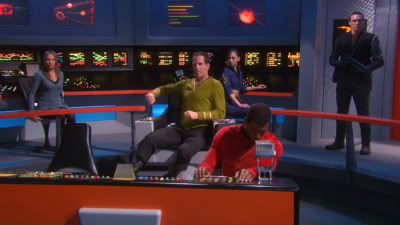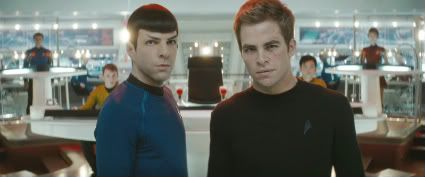Star Trek
Well, I wasn’t going to see the film. I really wasn’t. I had little interest in seeing it. Funny, considering that I’ve seen all previous 10 films, and have seen every episode of Star Trek, Star Trek: The Next Generation, Star Trek: Deep Space Nine, Star Trek: Enterprise and most of Star Trek: Voyager’s first 5 out of 7 years (The show sucked). I finally took the plunge. And you know, it wasn’t too bad. That is, after you take in account the Swiss-cheese writing, the time-travel “cheat,” and the paper thin “revenge plot.” Outside all of that, it’s not “bad.” Massive spoilers follow.
A Brave New Reality
Apparently Nero’s time travel has created a “new universe” which is completely separate from the Star Trek universe that has existed since 1966. Right off the bat the film ignores one of the central staples of how time travel “works” within the confines of the fictional universe.
The way that the writers (well, mostly Roberto Orci) have described it is that when the mining vessel Narada travels back in time, the very fact that there was time travel means that a “new” universe is created – and that any changes to this past will not affect the future of where the person who traveled into the past came from. Convoluted, confused? Please read on, perhaps it’ll make more sense soon.
Did Nero really create a new universe? Ignoring the most basic changes to the look-and-feel of the “universe” – something that’s fully acceptable and easy to ignore based on advances in the medium, as we wouldn’t really expect them to stick to 1960’s simplicity, even though it looked pretty good in the Enterprise episode “In A Mirror Darkly” (image at right) which is another story that uses time travel and alternate universes – but I’ll get to that later.
Ignoring the most basic changes to the look-and-feel of the “universe” – something that’s fully acceptable and easy to ignore based on advances in the medium, as we wouldn’t really expect them to stick to 1960’s simplicity, even though it looked pretty good in the Enterprise episode “In A Mirror Darkly” (image at right) which is another story that uses time travel and alternate universes – but I’ll get to that later.
As I read someone put so eloquently, “More disappointing is that this self-serving contrivance for the franchise reboot seems to be the only actual science the film attempts to accurately portray.”
The dreaded “continuity” peaks its head
Well, Nero was not only able to change time from the point that he arrived, but he was also able to change events from before he arrived.
They apparently know what Romulans look like (though this isn’t resolved until Kirk and Spock discover this in 2260-something on the television series). This is a major point of contention as no one knew who Romulans really were. The original story (Balance of Terror) was, in my opinion, a slight analogy to communistic fear – when they discover that Romulans and Vulcans are in-fact the same species – fear and doubt is cast on Spock. No such luck here.
"It's not mentioned in the scene on the Kelvin, but they are aware of it," Abrams confirmed, agreeing with the sharp-sighted fans. "Because later in the movie, Kirk mentions that they were Romulan. And we very purposely begin the film with a moment that, for fans of 'Star Trek,' is a left turn from the timeline they are familiar with." Yep, regardless of what the Mission Impossible III director thinks or feels fans "caught" Abrams. He even points out, "For fans of 'Trek,' yes, the Romulans appearing breaks with what is known to be 'Trek' canon. But that is on purpose." Of course, his explanation is less than stellar, since there’s no purpose beyond taking out any complexity of storytelling – probably with the assumption that the audience is too stupid to understand fine details.
Nero's incursion also apparently caused the Kelvin, a ship 20+ years older than the original 1701 to have nearly as many people (officers, crew, and civilians) on board the vessel as the Enterprise-D and over twice as many people on board as the original Enterprise did before Nero showed up.
And well, the silliest thing is now Pike, someone who is supposed to be “roughly” the same age as Kirk – is now well over 20 years older. Right. I guess because they killed off his father, they needed the “father figure/Obi Wan Kenobi” character to step in. And Chekov has somehow been born 3 years *earlier*. Why didn't they just call this a reboot?
Nonsense
Earth’s defenses are made up of only 7 starships? What about space dock – did Nero destroy that?
Brig? No, their protocol in this alternate universe is to jettison every person out onto the nearest habitable planet instead of putting them in the brig like any person, logical or not, would do. They probably decided that shooting Scotty back into space or onto another planet wasn't worth the effort.
Red Matter that will do whatever the writer's want it to do? A drop will destroy a planet in moments but an entire huge sphere of it (full of tens of thousands of drops) will take minutes to consume and destroy a moderately smaller spacecraft (compared to a planet).
So the ex-suspended cadet is now rank Captain straight out of the academy. Does that make any sense?
Missed Opportunities
The factor that I return to that bothers me the most about this is the time travel “cheat” – they cheated in telling the story about how the crew got together. No matter how you shape your argument, these people are essentially and radically different characters than what was presented in the 1966 series. They have little in common beyond having the same names. Their ages are different, their character backstories are nothing like what was presented before, and some of their character traits don’t resemble the original characters at all.
The basic story could have easily been written to "fit" with the start of Kirk's 5 year mission which began in 2265. Heck, the film could have still been an "alternate reality" film and still stuck to the established back story of the Federation, Enterprise, and crew up until the 5 year mission began. The Enterprise could have still been launched sometime around 2245. It could have still had the two (or so) 5 year missions that Pike took part in. Spock could still have served under Pike for 11 years. Kirk still could have been written to have lived through the Tarsus IV massacre. He still could have served on the Republic and Farragut.
I honestly believe that most of the bitching and moaning that people are doing would have been non-existent if they had stuck to what we knew about all the major characters, instead of completely revising their origins, and ages in some cases. They should have kept the start of the "5 year mission" to when it originally occurred, instead of being started at least 6 years "early".
The film could have easily still been about a Time-traveling Romulan that appears in 2265, soon before Kirk takes command of the Enterprise from Pike.
Ultimately there are only two explanations:
- This is an alternate timeline/parallel universe before Nero arrives
- This is an alternate timeline/parallel universe created because of Nero's time travel, the first time in franchise history they’ve done time travel like this.
The “Plot”
All the above culminates with the problems I had with the plot. Unfortunately this movie really doesn't hold up to any sort of heavy scrutiny in the slightest.
Nero’s motivation was pretty weak. His planet is destroyed, so he waits around for 25 years to take his revenge on the guy who was trying to save it? If they had presented the Spock and Nero back-story better, his thirst for revenge would have been more believable.
If there had been some kind of discussion where two sides to “saving” Romulus had been presented – one side being rejected in favor of Spock’s plan (a plan that Nero believed would have worked in time) – we would have some kind of motivation. The way they present it in the film is “well Spock and the Vulcans worked hard to save Romulus, and he didn’t do it in time.” That’s not really sufficient or reasonable evidence for the kind of revenge scheme he concocts.
So he just sits around for 25 years? Super weak.
Results

The writers of the film used "time travel" as carte blanche to create a completely "original" story about characters that happen to share the same names as their original series counterparts, with the occasional nudge and reference to Star Trek lore itself. The movie Galaxy Quest is one simple overnight script revision from being about a fictional Star Trek-like series to being actually about Star Trek.
The biggest shame is that we'll never see the "actual" origins of the 1701 crew from TOS. They still could have done it, even with the Time-travel gimmick. And considering that this iteration of Star Trek most likely does not have a lifespan beyond 3 films since the cast will move on after the 2nd and 3rd films, and Abrams, Orci, and Kurtzman won't be doing this for more than one or two additional films, you're left with either rebooting the franchise again, or actually trying something original. At that point it may be a tough sell to set it in the real Star Trek universe, or take the plunge and set it in this "new" Star Trek universe. Either decision will have major repercussions.
I just hope that this brings in people who will want to watch all the Star Trek that came before it and not just what comes after this.
With all that said, as a “Star Trek” film (ignoring my issues with how they rebooted the franchise), I’d say it is pretty good, but as a general film, it’s being given far too much praise for what the finished product provided us.
*** out of *****

2 comments:
LENS FLARE!!!!!!!!! LENS FLARE!!!!!
Plus, amazing post.
Bummer, I forgot to mention that I was blinded during scenes where there was no business adding additional light.
If they had skimped on the budget the frequency of lens flares in the film would make sense - adding in those would make it harder to see how "cheap" everything is. This was reported to be a $150 million dollar film, and what Abrams and his DoP did was the equivalent of pumping in fog to cover up half the sets.
Post a Comment